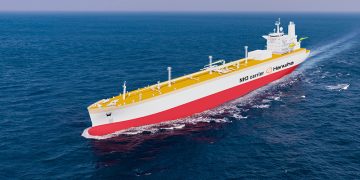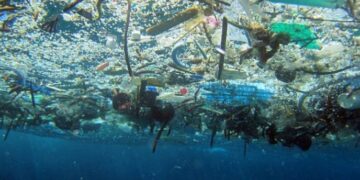The Standard Club’s loss prevention (LP) department comments on how this current crisis in oil prices coupled with the fall in demand has pushed several oil producers, traders and consumers to stock up, leading to a shortage in storage space for oil, not just crude but even clean products such as aviation fuel and gasoline.
The following article is based on the club’s experience, highlighting a number of lessons learnt from previous claims, and offering practical and operational considerations to assist operators in their planning for using tankers for storage
The oil industry has been through several cycles since weathering the price collapse of 2014. In 2020, the industry has been hit with two new phenomena almost simultaneously: oversupply (caused by the failure of negotiations between Saudi Arabia and Russia to agree on production cuts) and a demand shock (reflecting the economic impact of the Covid-19 lockdown).
This current crisis in oil prices coupled with the fall in demand has pushed several oil producers, traders and consumers to stock up, leading to a shortage in storage space for oil, not just crude but even clean products such as aviation fuel and gasoline.
Using tankers for the storage of oil in the current climate is one solution, and the club is seeing an increasing number of inquiries where members, both charterers and owners, are seeking guidance for such operations.
Background
As oil prices have gone through the floor, increasing numbers of producers and importers are choosing to stockpile their stores in hope of a rebound. Onshore storage facilities are at capacity, so more and more oil traders are looking at offshore storage on tankers.
It is a possibility that such operations might fall under the club’s offshore rules. We recommend that members consult their usual club contacts before entering such contracts so we can review each operation on a case-by-case basis and advise the members. There are many factors to be taken into consideration when a tanker is used as a storage vessel for extended periods. However, there are several common factors that we recommend all parties involved consider
before fixing a ship on an extended storage duty.
Duration
What is the expected duration for which the storage is required? When deciding on a ship, it is important to consider the duration of the operation, as this could affect certain factors, such as the validity of ship’s certificates during the entire period.
Anchorage
Choosing the right anchor location is not only critical to the safety of the ship, its crew and the environment, but also in avoiding any fines or arrests due to breach of local laws and the UNCLOS. It is recommended that approval is sought from the local port authorities before the ship’s arrival and that the storage tanker is anchored at a safe and sheltered anchorage within a designated area as prescribed by the coastal state.
Stresses on the anchor and chain should be considered due to the effects of prolonged anchorage and potential ship-to-ship operations, as the weight of more than one ship will work on the anchor and chain. Regular visual inspection of the anchor and chain should be carried out by heaving up the anchor and then re-anchoring every month on the basis that it is safe to do so.
STS operations
STS operations are probably one of the most critical operations for a storage facility. The club has seen an increased demand for pure storage, without the need for cargo operations during the storage period. In case cargo operations are required during the storage period, both the
storage tanker and the offtake tanker/barge should have an approved STS plan.
If the tanker is likely to be involved in multiple STS operations, a dedicated team and essential resources, such as STS provider, mooring master, fenders, hoses, tugs, etc, should be available.
The company should carry out a risk assessment and make a suitable operationspecific STS plan for all transshipments. Crew must be trained in STS operations. Provisions for getting assistance from shore along with tugs, pilots and emergency response equipment need to be considered prior to STS operations.
Watchkeeping
We emphasise the importance of bridge anchor watches and recommend that bridge watchkeeping is not neglected. In case cargo operations need to be carried out while the ship is at anchor, the crew working hours should be reviewed and the possibility of getting extra watchkeeping crew should be considered in order to maintain an effective anchor and cargo watch, and to manage crew fatigue.
Crew Welfare
As the crew is unable to go ashore, crew welfare on dedicated storage facilities is very important. On most facilities, the crew has long-term contracts with short on-board tenures and good facilities to keep morale high.
However, this might not be the case on temporary storage facilities. The crew might not have prior experience of storage tankers and this could cause stress and anxiety for the crew. It is recommended that the management have transparent and open communication with the crew and address their concerns, especially with regards to crew changes, contract tenures, shore leave, food and provisions, etc.
Adequate welfare and communication facilities should be arranged. Crew change plans should be discussed in advance to manage expectations and ensure a proper hand-over at the time of crew change.
Effect on the cargo shortage claims
There is a possibility that the cargo will be sold in smaller parcels. Cargo transfers out at sea via STS operations are often carried out in open water, where the tanker is exposed to the weather and the seas. This can lead to on-paper shortage claims given that the exact quantity is difficult to compute due to the constant movement of the cargo level in the tank.
The parties should also consider the characteristics of the cargo, as extended periods of storage could lead to layering or stratification of oil, leading to sediment and sludge deposit on the tank bottom. For certain cargoes such as aviation fuel, there is a possibility that small amounts of water might settle at the bottom of the tanks over extended periods in storage, leading to cargo quality and quantity disputes.
Cargo blending or commingling
Tankers are often used for storing fuel oil. The storage tanker might load multiple grades of cargo from different sources in the same tank. This could involve the blending or commingling of cargo. Blending should be allowed only when conducted in accordance with SOLAS regulations.
We recommend that permissions for blending operations are obtained on a case-by-case basis from the coastal state. It is essential to consider the possibility that if the tanks are loaded to 98% capacity, there would not be any space to recirculate the cargo or increase its temperature.
The ship staff would not be able to ascertain the quality or the quantity of blended or commingled cargo as the cargo might not mix homogeneously and the resultant density might not be consistent. This variance in the properties of the resultant product could lead to cargo shortage or quality disputes.
Cargo quality
Cargo quality may deteriorate over an extended period of time. It may become unstable, produce sediments or have significant microbial activity, potentially affecting the quality of the cargo. Sludge or wax formation can lead to cargo pumping issues and excess cargo remaining on board.
Effect on the vessel’s cargo tank coating and piping system
On a tanker carrying petroleum products, the tank coatings and seals/packings on valves, pumps, pipeline flanges, etc are designed and rated for a specific cargo and temperature range. Most coating manufacturers will have a cargo resistance list which will give a list of acceptable cargoes.
However, these are based on set parameters and for a specific stowage duration. Some cargoes might have toxic or acidic vapour, which can cause damage to the coating/steel in the vapour space of the tank due to prolonged exposure.
It is recommended to consult the OEM manufacturers to understand if there are any issues that might result from long-term stowage of certain cargoes.
Tank washing
There is a possibility that in order to maximise efficiency and to reduce lost time due to stripping, tanks will seldom be completely discharged during the storage period. Some cargo might be retained in the tank. This might disrupt the
Crude Oil Washing (COW) cycle or tank cleaning schedule and can lead to sludge build-up over a period. It should be considered if any additional cargo tank cleaning might be required after the completion of the storage contract and before the ship resumes active trading to avoid any shortage or contamination claims.
Tank venting
Tank venting, especially in the case of sour crudes with high H2S levels, is a health and safety hazard on stationary tankers, especially when there is not much wind. Venting of high H2S level cargo therefore might be restricted by certain coastal states.
This can have an impact on the maximum acceptable loading rate. Precautions as recommended in ISGOTT and the company SMS for handling high H2S level cargo should always be followed.
Any concerns with respect to gauging, sampling, venting, hose connection, etc should be discussed and standard operating procedures should be established to mitigate the risk. If more than one grade is loaded on the storage tanker, then the two grades might require vapour segregation along with the physical segregation. Ship staff should bear in mind that the vapour can migrate not only through the IG pipeline system but also through certain sections of the cargo line such as manifold cross-overs and drains. Each ship will have its own
unique pipeline layout.
It is recommended that adequate blanking or isolation means should be available to prevent any vapour contamination if storing more than one grade.
Engine maintenance
While the ship is on temporary storage duties, its status on the certificates will remain as a trading tanker. In order to maintain her classification status throughout this period, the ship will need to undergo maintenance and testing of the propulsion machinery.
It is recommended that in order to preserve the machinery, it should be tested in accordance with the class or manufacturer’s recommendation. Depending on the location, prevailing conditions, traffic or weather, the ship might also be required to remain in a state of readiness should there be an emergency situation.
Charterparty considerations
Parties should be aware of the potential legal implications when using tankers as a floating storage. Generally, voyage charterparties are not designed to cater for any issues that may arise as a result of the vessel being anchored for several weeks or even months. Unless additional clauses have been incorporated into the voyage charterparty, ultimately, the charterer will be required to pay significant demurrage and the demurrage calculations may give rise to a dispute between the parties.
Time charterparties are arguably better suited for long-term storage; however, disputes may still arise between the parties. It is therefore important to check the respective clauses beforehand to ensure that they meet the needs of each party.
In circumstances where a vessel remains stationary for a prolonged period of time in warm sea conditions, this could likely lead to hull fouling. A dispute could then materialise between the parties as a result of the diminished vessel performance and the costs associated with hull cleaning.
Often, time charterparties require the charterer to pick up all costs associated with hull cleaning, unlike most voyage charterparties where costs would normally be for the owner’s account.
Another consideration under the charterparty is whether the location where the vessel will wait and/or drift is considered safe. Among other things, the parties would need to take into account any actual or threatened war and/or piracy risks.
Finally, the extended storage may significantly impact the condition of the cargo on board, which may subsequently give rise to a claim(s) from cargo interests. Under a voyage charterparty, owners would normally be obliged to care for the stored cargo. However, the responsibility/risk may shift under the time charterparty.
Other considerations for long-term anchorage
• Availability of suitable compliant fuel, especially if the ship is in an ECA area.
• Arrangements for crew change will need to be made from an offshore location. Suitable arrangements for personnel transfer need to be made for the crew/ surveyors to board the offtake tanker/barge. If the transfers are done using a crane, then it should be approved for personnel transfer.
• Flag and class will need to be consulted for making arrangements to carry out the periodic surveys and certification.
• Suitable arrangements should be made to supply fresh water, provisions and stores to the ship and for the removal of any garbage, sewage or sludge in accordance with MARPOL requirements.
• The hull could get fouled with sea growth due to the extended stay at anchorage. An agreement should be made between the parties involved on possible hull cleaning costs after completion of the storage contract.
• The origin of the cargo should be thoroughly investigated to deal with issues such as smuggling or a sanctions breach.
Conclusion
Ships are designed to sail. Unlike purpose-built storage tankers, when deployed for storage operations, tankers will be faced with some unique challenges. These range from location and duration of storage, to preservation of hull and machinery, and the physical and chemical properties of the cargo being loaded. Another key aspect to this operation is also the safety and welfare of the crew, who might not have any prior experience in such operations.
The shipowner and the charterers should discuss these various challenges while negotiating the terms to ensure that they understand the risks and how they can both work together to mitigate these.
This will ensure that proper planning is done to avoid any claims, and that the operation is profitable for all the concerned parties and is carried out in a safe manner by a happy crew.
Written by Standard Club’s loss prevention experts Julian Hines, Captain Rahul Sapra and Nick Dimokidis.
Above article has been initially published on Standard Club’s website and is reproduced here with kind permission.
The views expressed in this article are solely those of the author and do not necessarily represent those of SAFETY4SEA and are for information sharing and discussion purposes only.
About the authors
 Julian Hines is Loss Prevention Manager at Standard P& I Club
Julian Hines is Loss Prevention Manager at Standard P& I Club
 Captain Rahul Sapra is Senior Surveyor at Standard P& I Club
Captain Rahul Sapra is Senior Surveyor at Standard P& I Club
 Nick Dimokidis is Claims Director at Standard P& I Club Asia Ltd.
Nick Dimokidis is Claims Director at Standard P& I Club Asia Ltd.





























































